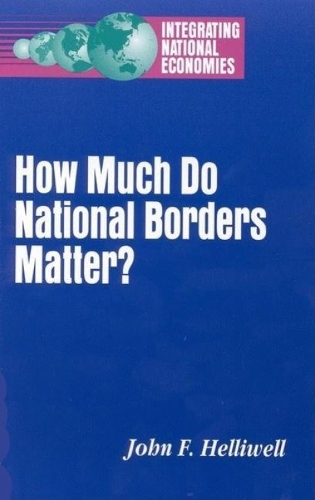
How Much Do National Borders Matter
(Paperback)
Publishing Details
How Much Do National Borders Matter
By (Author) John F. Helliwell
Bloomsbury Publishing PLC
Brookings Institution
1st July 1998
United States
Classifications
Professional and Scholarly
Non Fiction
Geopolitics
320.12
Physical Properties
Paperback
184
Width 152mm, Height 228mm, Spine 10mm
272g
Description
"
It is widely believed that globalization has proceeded to the point where international economic linkages are as strong as those within nations. Struck by research suggesting that this perception is dramatically mistaken, John Helliwell spent three years assessing the evidence. The results are reported in this book, the latest in Brookings' Integrating National Economies series. It provides the most systematic measurements yet available of the relative importance of global and national economic ties.
The original finding, based on a gravity model of trade flows, was that 1988 trade linkages between Canadian provinces were twenty times as dense as those between Canadian provinces and U.S. states of similar size and distance. A much longer and more detailed body of data is used to expand and explain these findings. Data for trade within and among OECD and some developing countries are used to show that the Canadian-U.S. results are applicable to other countries. Helliwell then surveys and extends the evidence relating to price linkages, capital mobility, migration, and knowledge spillovers, finding in all cases very large border effects.
The evidence offers a challenge to economists, policymakers, and citizens to explain why national economies have so much staying power, and to consider whether this is a good or bad thing. Helliwell argues that since large and small industrial economies have similar levels of income, there are likely to be diminishing returns from increases in globalization beyond levels sufficient to permit the ready exploitation of comparative advantages in trade, and relatively easy access to knowledge developed elsewhere.
"Author Bio
John F. Helliwell is professor of economics at the University of British Columbia. He has participated in several Brookings studies of international interdependence.
